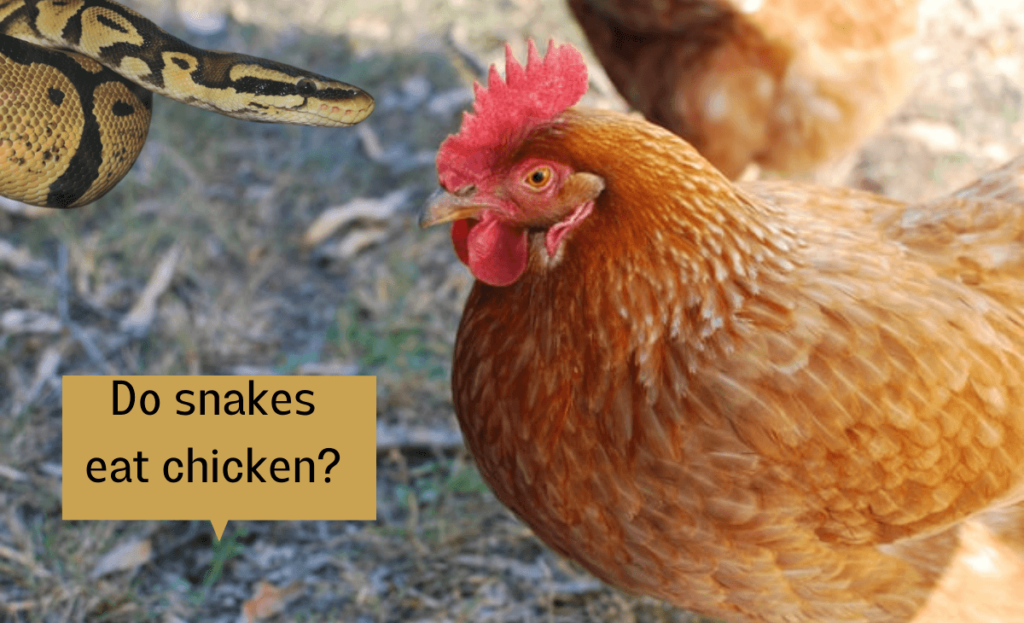The most important thing any backyard chicken keeper can do is create a snake-proof chicken coop. Snakes are a great threat to your chickens and cause severe injury or death. This article will discuss all you need to know about snake-proofing chicken coops. We will also discuss some of the best ways to keep snakes away from your chicken coop.
So, how do you keep a chicken coop snakeproof? And how can you go about creating one?
Let’s take a closer look.
Why Do Snakes Go into Chicken Coops?
Chicken coops provide a safe and secure place for chickens to live and a warm and dry place to rest. They also offer shade from the sun during the heat of the day.
Snakes may enter chicken coops searching for food, water, or shelter. Water dishes on the ground provide easier access for snakes to drink from, so it is vital to place them off the ground.
Eggs are a common food source for snakes, and a snake also goes into the coop to eat eggs. Snakes also like to eat small rodents like rats or mice found in poultry coops. A snake in a poultry coop is a threat to the chickens, as it can kill and eat them. So, you have to snake-proof chicken coop to protect your chickens.
How Do Snakes Get into Your Coop?
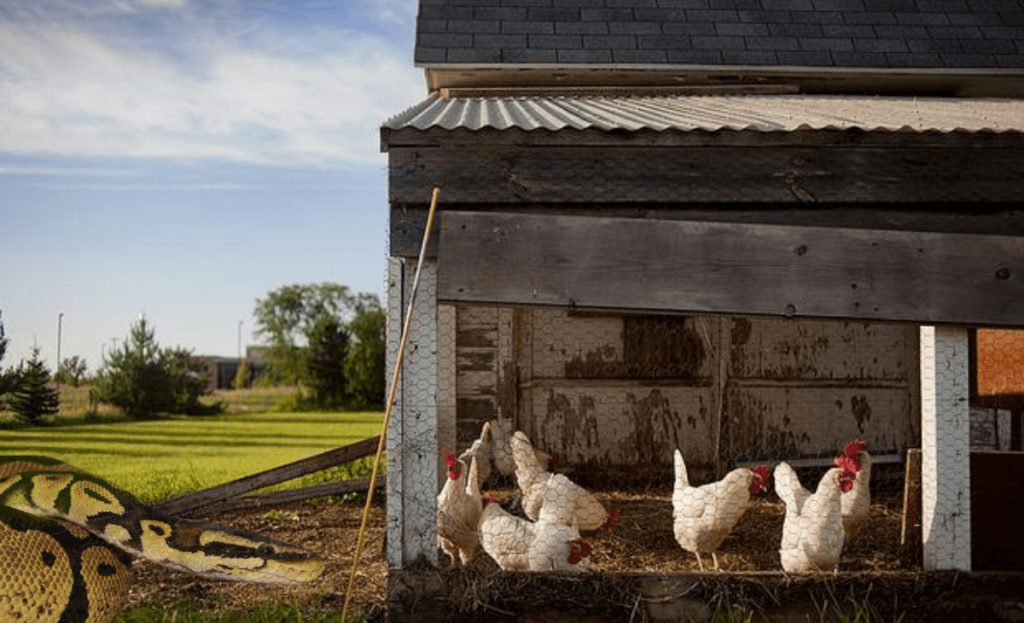
There are a few ways that snakes can get into your poultry coop. One way is through an open chicken coop pop door or window. Snakes only need a 1/2 inch diameter hole to get inside through a fence, wall, or other material. Not only can snakes fit through small openings, but they are also expert climbers.
They can also climb up to two-thirds of their length. They can climb higher with the support of posts, branches, or bushes. Snakes follow either the heat signatures (snakes use heat vision to attack prey) or the urine paths of mice and rats to seek food.
Mice and rats often urinate continuously while moving from one place to another. They use the same routes day in and day out. These routes take to the coop or feed.
You have to make the area less attractive for the snakes to enter the coop. Let’s see how.
How Do I Make the Area Less Attractive for Snakes?
Making the area less attractive for snakes is another crucial step. Chicken eggs and Rodents like Rats and Mice attract Snakes. You can follow the below methods to make the area less attractive to Snakes.
- Firstly, you should clean the area regularly and remove any food sources attracting snakes. You have to remove eggs and rodents and clean up any spilled feed or grain.
- Secondly, you can install a rat trap to help remove any rodents that might attract snakes.
If you follow these steps, you can make the area less attractive to snakes.
Seven Ways to Keep Snakes away from Chicken Coops
What are the seven effortless ways to keep snakes out of your coop and your chickens safe? Here we will reveal them all.
1. Snake-proof your chicken coop
One of the best ways to keep snakes out of your chicken coop is to snake-proof your chicken coop. You can do snake proofing in various methods; one of the methods is to use hardware cloth around the perimeter of your coop. Then another approach is to raise the coop off the ground, which will help to prevent the snake from being able to get underneath your chicken coop. Finally, the last method is to add apron fences or chicken wire around the coop. An apron will prevent many snakes from climbing up to the coop. Let’s look at each technique in detail.
Cover all holes and possible entrances with hardware cloth
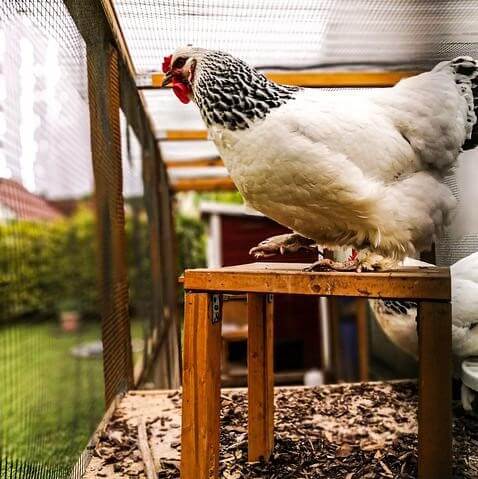
Hardware cloth is the most effective at keeping snakes and other predators out of your enclosure. Snakes have a knack for getting through tiny spaces, so it’s essential to check for holes around your coop. Prevent Snakes from entering by using a quarter-inch hardware mesh cloth, which is small enough to keep them out. Also, covering the chicken coop’s entrances with hardware mesh cloth will ensure no snake can get in.
Raise your coop
A raised chicken coop is less vulnerable to vermin attacks. You can extend it by adding a simple platform, chicken wire, fence, or railing. Rats, moles, and voles can burrow through holes and other possible passes in your coop to consume your poultry food. Snakes may enter as well.
Raising the coop makes it more difficult for rats to access and dissuades them from digging into it. Snakes won’t have to follow them if rodents can’t get in.
Add an apron to your coop
Installing a coop apron adds an extra layer of security to your poultry coop. It is a piece of fencing and hardware mesh cloth attached to the bottom outside of the pen. You can attach the apron to it with staples or screws if it is at least half an inch thick. And the apron extends by about 20 inches from the ground. It’s essential to make sure the apron stays underground so snakes and other predators can’t dig underneath it. You can cover it with dirt, wood chips, or gravel to keep it hidden.
2. Keep the grass around your coop short.
If you want to keep snakes out of your chicken coop, you need to keep the grass trimmed short around it. Snakes like to hide in tall grass, and they can easily sneak into your cell if the area is overgrown. Keeping the surroundings clear of brush and trimming the grass short will help deter snakes from coming near your chickens. Planting lemongrass and marigolds near the coop are other options to repel snakes.
3. Remove hiding spots
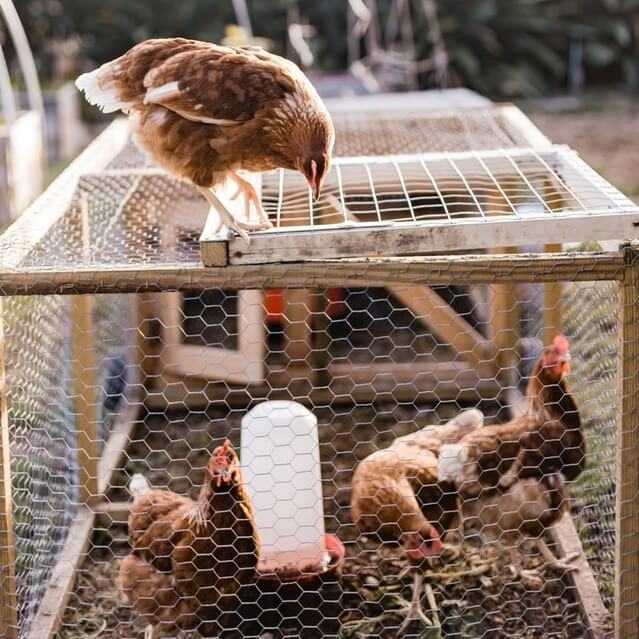
If you have a snake problem, it’s essential to inspect your chicken coop for potential hiding spots. Snakes love to hide in nooks and crannies, so removing woodpiles, rock piles, debris, equipment, and dense shrubs is vital to preventing snake infestations. Snakes will often seek shelter in warm, dark places, so you have to check around the roof, crevices and corners, and under the coop. You can create a snake-proof barrier enclosure using a fence or hardware mesh cloth.
4. Gather eggs regularly
One way to keep snakes out of your chicken coop is to gather eggs regularly. Snakes are attracted to eggs as they are an easy meal, so removing temptation by collecting eggs is critical.
One of the best ways to check your nesting box for eggs is to install a wireless chicken coop camera. When the camera for inside the chicken coop shows eggs in the box, you can make a trip to collect them.
5. Minimize poultry feed spillage
Minimizing feed spillage to keep snakes out of chicken coops is vital to protect your flock. The spilled feed can attract rodents and small animals to your chicken coop and run, providing a tasty snack for hungry snakes.
Keeping your chicken coop clean and free of spilled feed will discourage snakes go for your chickens. You can use an automated chicken feeder or treble feeder to minimize the amount of chicken feed wasted and spilled, which will aid in the reduction of rodents.
Another strategy many happy chicken owners abide by is restricting unwanted access and attention by storing your chicken food at night. You might also feed your chickens in a safe place during the day, but it won’t teach them to come in at night.
6. Control your rodent population
Keeping rats and mice away from your chickens is vital to keeping snakes away from your chickens. One option is to use a wire mesh around the bottom of the coop. The wire mesh will stop rodents from getting in, but make sure it is at least 12 inches off the ground so snakes can’t slither underneath.
Another option is to use a live trap. These traps allow you to catch rodents alive to release them away from the coop. They are usually made of metal and have a door that the rodent enters on one end. Once it’s inside, the door closes behind it. If you’re using a live trap, check it regularly. You don’t want any of your chickens to get trapped inside.
And finally, keep your coop clean. Cleaning it every few weeks and keeping it free of debris will help. It will help discourage rodents from living there in the first place.
7. Keep Guinea fowl
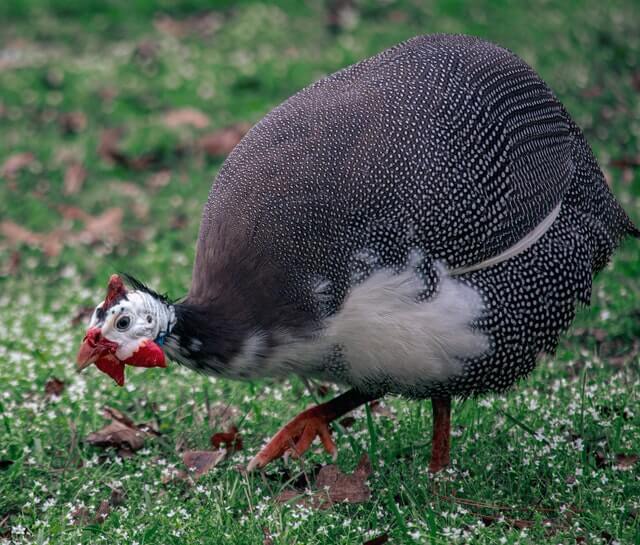
Guinea fowl keeps snakes away from your chicken coop. Guinea fowl are natural predators of snakes, and they will help keep the slithery creatures at bay. They are very territorial and will attack any snake they see. They make a fantastic alarm system, with a loud screeching sound that warns you of any approaching predators, animals like snakes and rats. Guinea fowl are a type of poultry that is native to Africa. They have black and white feathers, and they get their name because they sound like “guinea.” Guinea fowl are considered an agricultural pest in some parts of the world, but they can help keep snakes away from your poultry coop.
8. Kill snakes with repellents or other methods
There are some mixed views over whether snake repellents work or not. Some people say they do work, while others claim they don’t. The truth is that there is no definitive evidence as to whether or not repellents work. Few poultry owners report success with electronic snake repellents. These transmit an electronic signal or ultrasonic vibration that is supposed to repel snakes.
Are there plants that naturally repel snakes?
Several plants are known to repel snakes naturally. These plants include garlic, onions, rosemary, thyme, snakeroot lemongrass, and marigold. This plant has a strong odor that snakes don’t like and will keep away. You can look for a natural way to keep snakes away from your coop by planting some of the above plants. Grow the plants around your enclosure or where you feed your chickens to help deter snakes. They may not be 100% effective, but they can help prevent snakes from coming near your home or chicken coop.
Are there commercial snake repellents?
There are many commercial snake repellents on the market. They include high amounts of sulfur to keep snakes away. Sulfur does not harm snakes, and they do not exhibit any adverse reactions despite exposure to large quantities of sulfur.
According to the Humane Society, most snake chemical killers and repellents aren’t effectively poisonous or deterrents. However, many people utilize sulfur as a snake repellent and claim it works.
Will mothballs keep snakes away?

There is a lot of information on the internet about keeping snakes away from chickens with mothballs. However, the majority of this information does not rely on scientific evidence. Mothballs emit fumes or poison into the air killing the tiny moths and flying things in small spaces. However, they do not work in wide-open places and are poisonous when consumed. Mothballs are not a magical cure-all, despite what the internet claims. It would take a toxic amount of mothballs to harm a snake. Snakes may avoid the area and access the coop elsewhere unless you create a “fence” of mothballs around it.
Mothballs are poisonous to chickens. In several studies, 30% of chickens that ate mothballs died or became sick, and others who didn’t die passed the poison to their eggs. For this reason, we suggest skipping the mothballs when trying to keep snakes out of coops.
What about using golf balls to kill snakes?
There are many simple methods of keeping snakes away from your chickens; one of the most popular ones is using golf balls. Some people believe that if you place golf balls around your chicken coop, the snake will be confused and go after the golf ball instead of the eggs. However, this is not true.
Snakes have a perfect sense of smell, distinguishing between different scents. So, they are very likely to identify that a golf ball does not smell like a real egg and not eat it.
Snakes are also masters at regurgitating items they eat. So, any snake that does eat a golfball will regurgitate it and continue to be a menace to your coop. As a result, using golf balls as a snake deterrent is not adequate.
can you buy a snake trap for chicken coop?
Yes, you may remove a snake humanely in a chicken coop with a snake trap.
There are a few different traps that you can use to catch snakes. One type of trap is the funnel trap. This trap is a funnel-shaped cone with an entrance narrower than the rest of the cone. It is too narrow for the snake to get out of the cone once it enters it.
Another type of snake trap is a Minnow trap. Essentially, it is a wire mesh cage used to catch small fish, such as minnows. It’s perfect for capturing snakes without harming or killing them. Place an egg in the trap and secure it with a clip. The snake may enter but not leave, which will enable you to relocate it.
As many reviews state, coop owners have had great success with the Frabill Minnow Trap for capturing snakes threatening their chickens.
Can I Buy a Snake-proof Chicken Coop?
Yes, you may purchase snake-proof chicken coops already built. They’re only snake resistant when mounted on a flat surface or a hard floor. A sturdy, vertical wall 2 feet high prevents snakes from entering the area. You can make your current chicken coop more snake-resistant with a quarter-inch of hardware cloth coop apron.
FAQs About Snakes
Where are snakes most likely to be a problem?
Snakes are most likely to be a problem in areas where they can find food quickly. The site includes fields, gardens, and wooded areas. Snakes prefer to live near water sources, such as ponds, streams, and rivers. They may also be a problem around farms and homes where there is a lot of prey available, such as rodents and birds. As a result, snakes are common in backyards, gardens, and coops.
Which species of snake causes problems for chicken keepers?
The most common snake species that cause problems for chicken keepers is the rat snake. This snake is non-venomous and eats rodents, making it a threat to chickens. Other common snake species that can be a problem for chickens include the Black snakes, the cottonmouth, Chicken snakes, Milk Snakes, and the Kingsnakes.
How high can snakes climb?
Snakes can climb and may go under the coop wall. Therefore, make sure you cover the roof and the floor with enough mesh. The snake’s length typically determines the size of the mesh. In most cases, a snake can reach up to around half or two-thirds of its length, especially if it has some additional support.
Do rat snakes eat chicken and chicken eggs?
Yes, rat snakes can consume full-grown chickens. However, it’s more probable that they’re there for the chicken eggs since snakes have eaten hatchlings from beneath the mother hen, baby chicks, and taken adult chickens. Snakes do not eat every day; it might take anything from four to forty days to return for a refill.
Do snakes eat chickens that have died?
It is not clear whether the snake feeds on a dead chicken or not.
Will chicken wire keep snakes out?
One of the best ways to keep snakes out of your chicken coop is to use chicken wire. This type of fencing is inexpensive and easy to install and specifically designed to keep chickens in and predators out.
It’s important to choose a chicken wire that has small enough holes (1×4 inch or less). Otherwise, the snakes will be able to slither right through.
You should also bury the chicken wire around the perimeter of the chicken coop. This will create a barrier that the snakes will have difficulty getting through.
In addition to using chicken wire, you can also take other steps to keep snakes out of your chicken coop, which are addressed in this article.
Snake Proof Chicken Coop Conclusion
Snakes can be a threat to chickens and chicken eggs in a coop. They may consume full-grown chickens and are more likely to go for the eggs. Snakes are attracted to areas where they can find food quickly, so it is essential to make a snake-proof chicken coop.
You can purchase a snake-proof chicken coop or make your current chicken coop more snake-resistant. You can also apply the methods discussed in this article to keep your chickens safe and secure.

